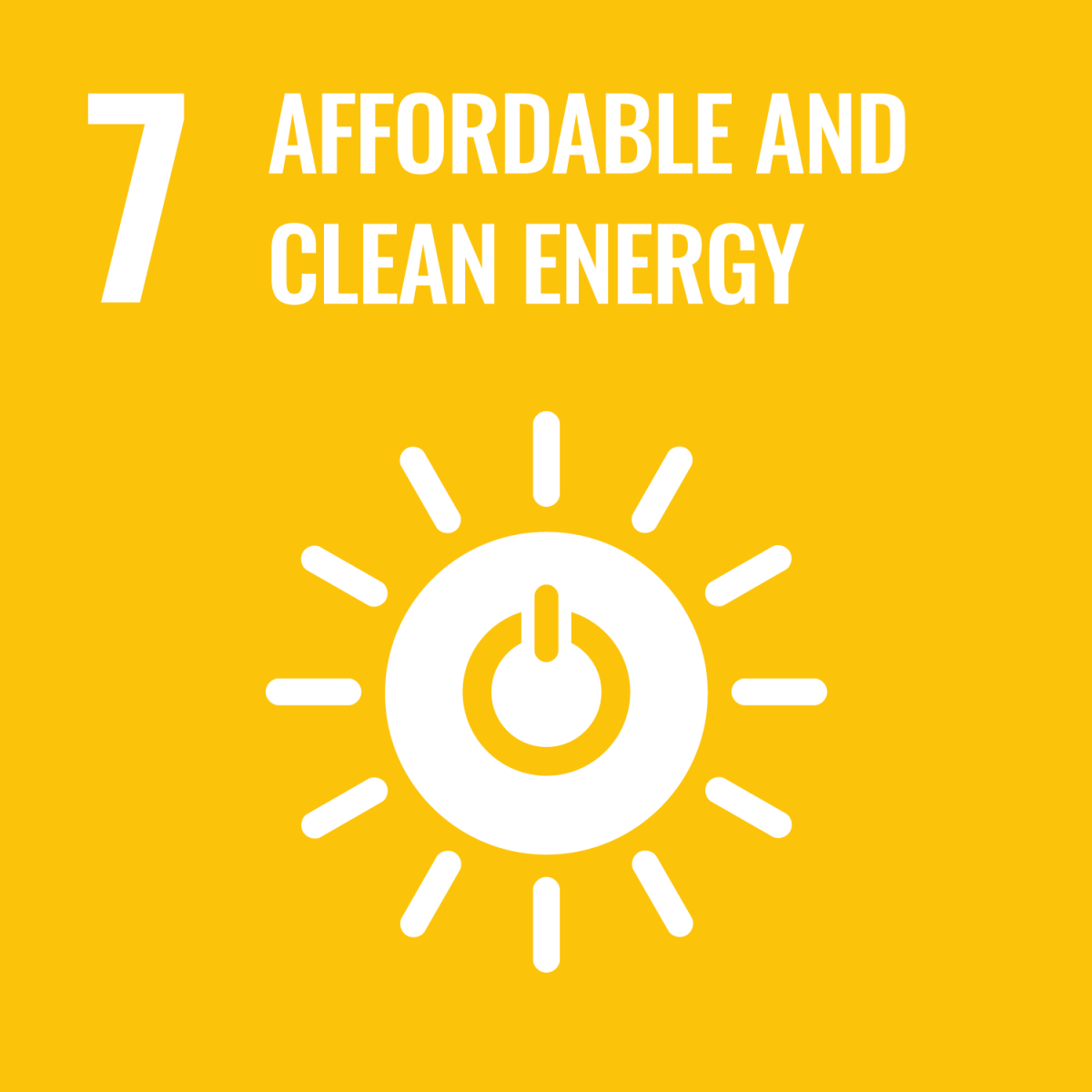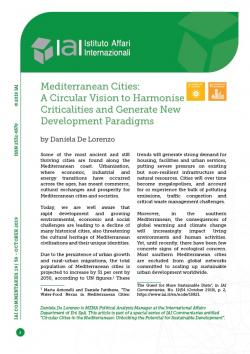Mediterranean Cities: A Circular Vision to Harmonise Criticalities and Generate New Development Paradigms
Mediterranean Cities: A Circular Vision to Harmonise Criticalities and Generate New Development Paradigms
Daniela De Lorenzo*
Some of the most ancient and still thriving cities are found along the Mediterranean coast. Urbanisation, where economic, industrial and energy transitions have occurred across the ages, has meant commerce, cultural exchanges and prosperity for Mediterranean cities and societies.
Today, we are well aware that rapid development and growing environmental, economic and social challenges are leading to a decline of many historical cities, also threatening the cultural heritage of Mediterranean civilisations and their unique identities.
Due to the persistence of urban growth and rural-urban migrations, the total population of Mediterranean cities is projected to increase by 51 per cent by 2050, according to UN figures.[1] These trends will generate strong demand for housing, facilities and urban services, putting severe pressure on existing but non-resilient infrastructure and natural resources. Cities will over time become megalopolises, and account for or experience the bulk of polluting emissions, traffic congestion and critical waste management challenges.
Moreover, in the southern Mediterranean, the consequences of global warming and climate change will increasingly impact living environments and human activities. Yet, until recently, there have been few concrete signs of ecological concern. Most southern Mediterranean cities are excluded from global networks committed to scaling up sustainable urban development worldwide.
The Cities Climate Change Leadership Group, also known as C40, for instance, is focused on tackling climate change and promoting urban initiatives to reduce greenhouse gas emissions and climate risks, while increasing the health, wellbeing and economic opportunities of urban citizens through collective action.[2] One third of these initiatives were an outgrowth of collaboration between cities within this network and 70 per cent of C40 cities have implemented new initiatives as a result of participating in the network.[3]
Cairo – together with Amman – was one of the few Arab cities present in this network. While Amman continues to be a member, the Egyptian capital was judged to have failed to meet the C40’s participation standards and, as result, had its membership suspended.
Cities are not autonomous territorial units. Their development also depends on their relevance within urban corridors and international city networks. Moreover, it is important to stress “the relevance of rural-urban linkages on which the sustainability of nations depends”.[4] Global phenomena like rural-urban migrations are generating low income mega-cities, that in some cases are far more populated than high-income countries.
Finally, we should not forget that rapid demographic growth is usually correlated with relatively low incomes. To date, urban structures and consumption models seem, by definition, at odds with sustainable practices. Indeed, continuous urban growth has historically been made possible only through subsidies and a particular energy market structure.
To deliver both ecological and financial stability, a different kind of economy is needed. This means passing from a linear to a circular approach to development. Furthermore, only a circular and creative economy can change labour structures and foster inclusiveness.
In the energy sector, a circular approach can guarantee better services, lower costs, less climate impact and minimise negative externalities at the urban level. During a seminar entitled “Pathways to Regional Energy Transition in the Mediterranean Area” held on 9 September in Abu Dhabi, during the 24th World Energy Congress,[5] some interesting takeaways emerged.
While the southern Mediterranean is not on track to face climate change, the region is already host to renewable resources that are among the most competitive at a global level. In particular, “the paradigm of a new energy system, based on the partnership between renewable energies and natural gas, is confirmed for the Mediterranean” and the southern shore. Moreover, natural gas will be the main component of the power mix over next decades.[6]
Important gas reserves in the Eastern Mediterranean – including those recently discovered by ENI in Egypt – can significantly lower import dependence. Algeria, Egypt and Israel will indeed be able to meet the bulk of future domestic gas needs in the region. Efficiency and renewable energies are also confirmed as high priority issues in the Mediterranean agenda of energy leaders shaped by the World Energy Issues Monitor 2019.[7]
Another essential starting point is the strengthening of Euro-Mediterranean energy cooperation to share strategies, efforts and experiences, and to deploy energy infrastructure. A structured regional cooperation framework on a sustainable Mediterranean energy should be launched as soon as possible in order to deepen and broaden the energy transition process.
Against this backdrop, the role of private actors and the energy industry is also changing. Historically, the sector has fuelled global economic growth and prosperity but also holds a significant responsibility for generating emissions and pollution. Today, this sector can play a different role and become an essential and vital contributor to overcoming current criticalities in the energy and sustainability domains.
This industry has the capabilities to give maximum access to energy, while sustaining a long-term paradigm shift towards a new energy system, based on a diversification of the energy mix, a larger use of renewables and the promotion of efficient energy schemes.
Energy companies can also combine financial and technology assets with research and knowledge on the improved use of these assets to help promote new circular practices that are able to maximise the sustainability of production and limit waste. The promotion of wiser technologies, such as a green conversion of fossil refineries, or waste to fuel processes can achieve very high sustainability standards.
Particular attention can also be paid to the efficient use of natural resources, especially in water stressed areas like the Middle East and North Africa, where it is necessary to pursue efficient water management and monitor water risks and drought scenarios to define long-term actions.
More broadly, practicing circularity means rethinking the business approach and the very concept of efficiency, focusing on the achievement of long-term objectives and risk prevention. In this regard, Mediterranean cities can become primary laboratories to experiment with new models of efficient energy use.
A multi-stakeholder approach is also needed for this transition towards a circular economy. Governments are a key player but, as highlighted in the WEF White paper on circular economy in cities, most of them “still lack a sense of urgency”.[8] In this respect, cities should set up mechanisms to monitor resource usage and “to prioritize a systematic transition from the linear paradigm of production and consumption to a circular model” (such as keeping materials in use for as long as possible, maximising their economic value, promoting a classification of waste as a resource).[9]
Government institutions should remove subsidies that encourage the use of resources or consumption of non-renewable energy, formulate policies that promote innovation and provide incentives to businesses, without overburdening the community.
Energy companies can also work in partnership with international organisations, governments and non-governmental organisations to promote sustainable development in host countries, since the circular vision of the city is strictly linked with the UN’s Sustainable Development Goals (SDGs).
In this framework, ENI has signed partnerships with the Food and Agriculture Organization (FAO) for access to clean and safe water; with the United Nations Development Programme (UNDP) to pool expertise on energy access and sustainable development; and with the United Nations Industrial Development Organization (UNIDO) to focus on youth employment, agricultural value chains, renewable energy and energy efficiency.
More recently, ENI has also been confirmed as a UN Global Compact LEAD participant, and identified as one of the most highly-engaged participants of the world’s largest corporate sustainability initiative.[10] In many of ENI’s industrial centres, which overlook the Mediterranean from both its northern and southern shores, the company is carrying out projects to foster the circular economy.
In Gela, Sicily, a recently launched bio-refinery represents ENI’s second worldwide example of a green conversion from a fossil-fuel refinery. This project will achieve very high sustainability standards, reducing the environmental impact derived from the disposal of waste products, supply the fuel sector with renewable products (namely biofuels) and have positive effects on local industry, both during the construction and revamping phases, which officially started in September 2019.
Since innovation is a keyword to enable and boost sustainable development within the energy transition, other projects are already in the pipeline. Among them, is a pilot plant built in Gela (in operation since December 2018) to test technology for the production of bio-oil from organic waste produced in the surrounding area, or the newly developed solar concentration “mirror” system which is expected to start soon. Cutting edge technology used in these projects has been developed by ENI in collaboration with the Massachusetts Institute of Technology (MIT) and the Milan Polytechnic.
However, the main driver for a sustainable future is not technological optimism, but “shared knowledge that becomes an ethic”.[11] In times of economic turmoil urban dimensions are most exposed to environmental and social criticalities. At the same time, Mediterranean cities seem to emerge as the most suitable places where to think and generate new human-centred development paradigms, through a wiser approach based on circularity and sustainability.
This vocation matches a values-oriented mission statement linked to the climate and environment, access to energy, cooperation, partnerships, respect for people and human rights. ENI considers these as its own principles and is actively working towards the attainment of the UN’s SDGs, in order to achieve a better and more sustainable future for all.
* Daniela De Lorenzo is MENA Political Analysis Manager at the International Affairs Department of Eni SpA. This article is part of a special series of IAI Commentaries entitled “Circular Cities in the Mediterranean: Unlocking the Potential for Sustainable Development”.
[1] Marta Antonelli and Daniele Fattibene, “The Water-Food Nexus in Mediterranean Cities: The Quest for More Sustainable Diets”, in IAI Commentaries, No. 19|54 (October 2019), p. 2, https://www.iai.it/en/node/10821.
[2] See the official website: https://www.c40.org.
[3] C40 Cities, Annual Report 2017, December 2018, p. 25, https://c40-production-images.s3.amazonaws.com/other_uploads/images/2056_C40_ANNUAL_REPORT_2017.original.pdf.
[4] Borja M. Iglesias, “Localising the Next Wise Cities in the Mediterranean: The Multilevel Challenges of MENA’s Emerging Urban Region”, in Eckart Woertz (ed.), “Wise Cities” in the Mediterranean? Challenges of Urban Sustainability, Barcelona, CIDOB edicions, June 2018, p. 67, https://www.cidob.org/en/publications/publication_series/monographs/monographs/wise_cities_in_the_mediterranean_challenges_of_urban_sustainability.
[5] World Energy Council Italia, Pathways to Regional Energy Transition in the Mediterranean Area, 17 September 2019, https://www.wec-italia.org/?p=13900.
[6] Ibid.
[7] World Energy Council, The World’s Energy Agenda & Its Evolution. Issues Monitor 2019, February 2019, https://www.worldenergy.org/publications/entry/issues-monitor-2019-worlds-energy-agenda-evolution.
[8] World Economic Forum and PwC, Circular Economy in Cities Evolving the Model for a Sustainable Urban Future, Geneva, World Economic Forum, March 2018, p. 21, https://www.weforum.org/whitepapers/circular-economy-in-cities-evolving-the-model-for-a-sustainable-urban-future.
[9] Ibid., p. 23.
[10] ENI, Eni Announced as Global Compact LEAD, 23 September 2019, https://www.eni.com/en_IT/media/2019/09/eni-announced-as-global-compact-lead.
[11] Giulio Sapelli, “Un cambio di rotta. Note sull’economia circolare”, in Equilibri, Vol. 23, No. 1 (April 2019), p. 9.


-
Dati bibliografici
Roma, IAI, ottobre 2019, 5 p. -
In:
-
Numero
19|59




